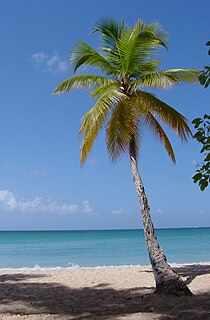
The Arecaceae is a family of perennial flowering plants in the monocot order Arecales. Their growth form can be climbers, shrubs, tree-like and stemless plants, all commonly known as palms. Those having a tree-like form are called palm trees. Currently 181 genera with around 2,600 species are known, most of them restricted to tropical and subtropical climates. Most palms are distinguished by their large, compound, evergreen leaves, known as fronds, arranged at the top of an unbranched stem. However, palms exhibit an enormous diversity in physical characteristics and inhabit nearly every type of habitat within their range, from rainforests to deserts.
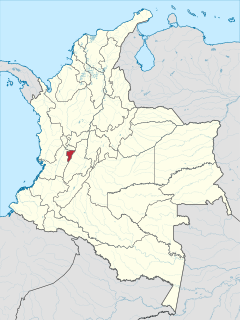
Quindío is a department of Colombia. It is in the western central region of the country, crossed by the Andes mountains. Its capital is Armenia. It is famous for the quality of the coffee plantations, colorful architecture, benign weather, variety of hotel accommodations and tourist landmarks. This department is located in a strategic area, in the center of the triangle formed by the three main cities of the country: Bogotá, Medellín and Cali. Quindío is the second-smallest Colombian department with 12 municipalities. Ethnographically and culturally it belongs to the Paisa region.
Wax palm can refer to several species of palms:

Iriartea is a genus in the palm family Arecaceae, native to Central and South America. The best-known species – and probably the only one – is Iriartea deltoidea, which is found from Nicaragua, south into Bolivia and a great portion of Western Amazonian basin. It is the most common tree in many forests in which it occurs. It is known by such names as bombona or cacho de vaca. In the Murui Huitoto language of southwestern Colombia, it is called jɨagɨna or jɨaìgɨna, in western Ecuador it is known as pambil and in Peru it is known as the pona palm.

Ceroxylon quindiuense, often called Quindío wax palm, is a palm native to the humid montane forests of the Andes in Colombia and northern Peru.

The yellow-eared parrot is an endangered parrot of the tropics in South America. It is found in the Andes of Colombia. This species was thought to be extinct up until April 1999, when a group of researchers that were sponsored by ABC and Fundación Loro Parque, discovered a total of 81 individuals in the Colombian Andes. It is currently enlisted as vulnerable on the International Union for Conservation of Nature (IUCN) Red List. Its current population trend is increasing. It is closely associated with the wax palm.

The Cocora valley is a valley in the department of Quindío in the country of Colombia. It is located in the Central Cordillera of the Andean mountains. "Cocora" was the name of a Quimbayan princess, daughter of the local chief Acaime, and means "star of water".
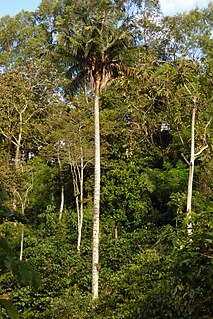
Ceroxylon alpinum, also known as the Andean wax palm is a species of palm tree native to Colombia, Ecuador, and Venezuela. It is threatened by habitat loss.

Ceroxylon is a genus of flowering plant in the family Arecaceae, native to the Andes in Venezuela, Colombia, Ecuador, Peru, and Bolivia, known as Andean wax palms.
Ceroxylon amazonicum is a species of palm tree. It is endemic to Ecuador. There are only four known populations. The species is threatened by deforestation.

Ceroxylon echinulatum, also known as the Pumbo wax palm is a species of flowering plant in the family Arecaceae. It is found only in Ecuador and Peru. Its natural habitat is subtropical or tropical moist montane forests in the Andes. It is threatened by habitat loss.
Ceroxylon sasaimae, also known as the Sasaima wax palm is a species of flowering plant in the family Arecaceae. It is found only in Colombia. It is threatened by habitat loss.
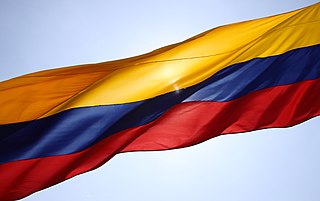
The National symbols of Colombia are the symbols which represent the national identity of the Republic of Colombia as a sovereign state. The national symbols intend to represent the Colombian identity by creating visual, verbal cultural iconic representations of the national people, values, goals, and history.
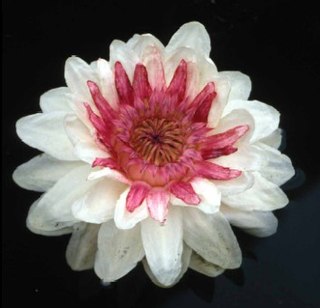
The Flora of Colombia is characterized by 130,000 species of plants that have been described within Colombian territory.
Gloria Amparo Galeano Garcés was a Colombian botanist and agronomist specializing in the palm family. Galeano was a faculty member at the National University of Colombia, and was the director of the Institute of Natural Sciences from 2003 to 2006. She received her Ph.D. from the University of Aarhus, Denmark in 1997.

Ceroxylon vogelianum, also known as the Vogels wax palm is a palm native to the Andes from Venezuela south to Peru in humid montane forest, at an elevation of 1900 – 2900 meters.

The Magdalena Valley montane forests (NT0136) is an ecoregion in the Andes mountains of central Colombia.

Ceroxylon ceriferum, also known as the Sacred wax palm is a species of Ceroxylon from Colombia and Venezuela.

Ceroxylon parvifrons, also known as the Golden wax palm is a species of Ceroxylon from Colombia, Venezuela, Ecuador, Peru, and Bolivia.
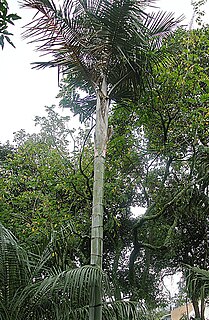
Ceroxylon ventricosum, also known as the Ecuadorian wax palm is a species of Ceroxylon from Colombia and Ecuador.















